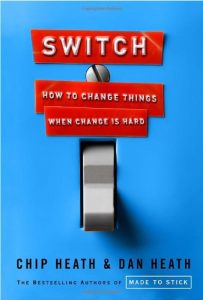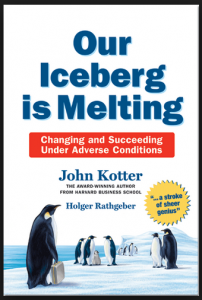
Ahhhhh Change Management… the dark art of changing things when change is hard.
While it’s not as sexy as it used to be — like adding salted caramel to your line of fudge/ ice-cream/ tofu or starting a microbrewery in Tasmania — managing behavioural change is undoubtedly still a handy skill set across work and life.
Here are two great books on change that are worth reading or getting re-acquainted with — Switch and Our Iceberg Is Melting.
Switch
There’s a good chance you’ve already read something by the very successful brothers, Chip and Dan Heath (Made to Stick, Decisive). There are good reasons for this.
 Switch is accessible without being condescending. It’s full of research, interesting stories and personable anecdotes (by the end, you’ll want to invite the Heath brothers round to your next dinner party, both because they’d impress all your friends and because they come across as being just so gosh-darn-American nice!)
Switch is accessible without being condescending. It’s full of research, interesting stories and personable anecdotes (by the end, you’ll want to invite the Heath brothers round to your next dinner party, both because they’d impress all your friends and because they come across as being just so gosh-darn-American nice!)
More importantly, the book is structured around a memorable framework that guides their approach to change; namely directing the rider (rational mind), motivating the elephant (emotions or heart) and shaping the path (environment and situation).
Contained within is a myriad of strategies aimed at all three components. I particularly found their material on goal setting helpful and nuanced – plenty of people have written about SMART and BHAG goals; the Heath brothers are the first that I’ve heard discuss ‘Black and White’ goals and their effectiveness in the right context. Their section on identity as motivating the elephant is also quite powerful (Who am I? What kind of situation is this? What would someone like me do in this situation?)
Lastly, it’s almost worth the price of admission alone for pointing out common (at least in my case) misperceptions people have in relation to change, namely:
- What looks like a people problem is often a situation problem.
- What looks like laziness is often exhaustion.
- What looks like resistance is often a lack of clarity.
(I’m getting them tattooed right now – in Latin – ‘cause that always looks more sophisticated…)
In summary, this is a great book. Its aim is “to help you change things” and given its multi-pronged approach, its veritable tool-box of strategies and examples, and the very readable style, it lends itself to succeeding in just about any situation. This is the final beauty of the book: its broad applicability. The ‘rider, elephant, path’ approach and attendant strategies are useful beyond the boardroom and organisation, and will likely be of benefit for trying to help your children, parents, friends, sporting club – and even yourself – change.
Our Iceberg Is Melting
Just when you thought change management couldn’t be any more accessible than Switch, along comes this self-styled fable that has penguins and pictures, all enclosed in 147 relatively small pages.
 John Kotter is a recognised authority on change management, and wrote Leading Change, possibly the most famous and influential book on change management.
John Kotter is a recognised authority on change management, and wrote Leading Change, possibly the most famous and influential book on change management.
Our Iceberg Is Melting boils down the essentials into an 8 step process, and packages it up in a winsome and genuinely funny story set in a penguin colony that is wrapping its head around the potentially disastrous effects of global warming.
This book can be devoured in about 30 minutes and has a handy summary of the 8 step process straight after the fable. It’s going to be particularly pertinent if you find yourself managing change in an organisation, or if you’re the kind of person who needs a process to go through (Switch is more conducive to using like a tool box).
However, the process relies on ‘creating a sense of urgency’. The others involved need to see the need for change and must act immediately. This is where the approach may fail. It’s not that hard to create a sense of urgency if your iceberg really is melting or your platform happens to be burning. However, there are plenty of situations where change is desirable but the risks of not changing aren’t nearly that acute or immediate. Trying to manufacture a sense of urgency when it’s palpably not warranted is a great way to get people off-side (especially adults; especially adults with much experience in the public sector).
So, if the change you’re interested in doesn’t have any immediate or urgent bearing on the welfare of your health, relationship status, job security, significant others, or dog, I’d consider starting with Switch as an approach.
Both books are great, both are worth reading, only one has penguins, but Switch is more likely to be relevant for most of us.
Have you read these books and what did you find to be most useful?




